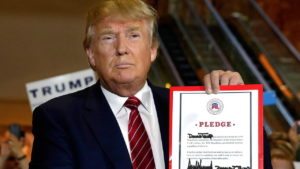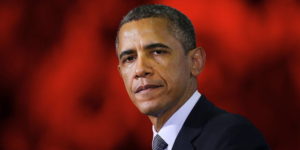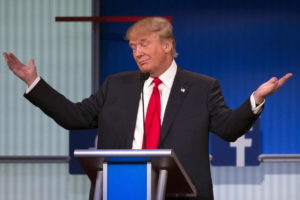The first Republican presidential debate began with FOX News moderator Bret Baier requesting that any of the ten candidates raise their hand, who would NOT commit to supporting the ultimate Republican nominee, if it wasn’t him. Donald Trump was the only candidate to raise his hand. This lead to considerable speculation, and concern, that if Trump failed to win the Republican nomination, he’d run as an independent, split the conservative vote, and guarantee another Democrat president for the next four, probably eight, years. (I was one of those voicing this concern – to review my August 12th blog, click here.)
So how much solace should we take in Trump’s Pledge, which in case you’re interested reads as follows:
I think we should take SOME solace from it. It’s better than nothing. But it’s not a legally binding document. If he broke the pledge, he’d obviously be breaking his word. His excuse would probably be that he didn’t think he was being treated fairly. But what political candidate ever does?
So why did Trump sign the pledge? I believe there are a number of reasons. First of all, there are a fair number of Republican primary voters who were offended by Trump’s refusal to agree to support the ultimate Republican nominee (including me.) I could not support anyone who would be willing to risk splitting the conservative base, and virtually guaranteeing another Democrat president, when our country so desperately needs to reverse the dangerous path Barack Obama has set for America.
Second, Trump is winning so big at the present time, that I think he believes he has such a good chance of winning the nomination, that signing the pledge is a small price to pay to reinforce his support among Republican primary voters. And if he fails to win the nomination, he could still break the pledge with minimal damage and run as an independent. (Hope I’m wrong on this one.)
Third, South Carolina, which has one of the earliest, and most important primaries, just recently required that for a candidate to be listed on the primary ballot, he or she must agree to support the ultimate Republican nominee. Other states have similar requirements, called sore loser laws. However, most states do not apply these laws to presidential candidates. So although this may have been considered by Trump, or by his advisors to the extent that he has advisors, it probably wasn’t a major factor in his decision.
And finally, as Donald Trump has become more confident that he will actually be the nominee, signing the pledge himself has put the other Republican candidates in the position that they have to commit to supporting him should he be the nominee. Chris Christie, Jeb Bush, and others have already committed to doing so. So the loyalty pledge goes both ways (actually 17 ways.)
All that being said, I’d like to go back to the major point here. We absolutely have to win the presidency this time, no matter who our nominee is. It is too horrible to fathom the damage that would be done to our country if the Democrats won a third term: a Supreme Court that veers completely to the left, for a generation; a more and more dangerous world, due to the lack of U.S. leadership; a stagnant economy that fails to create good-paying jobs needed by graduates with huge debts hanging over their heads; a failed immigration policy which is threatening the future of this great nation; and on and on.
We absolutely must win, if this nation is to survive.







